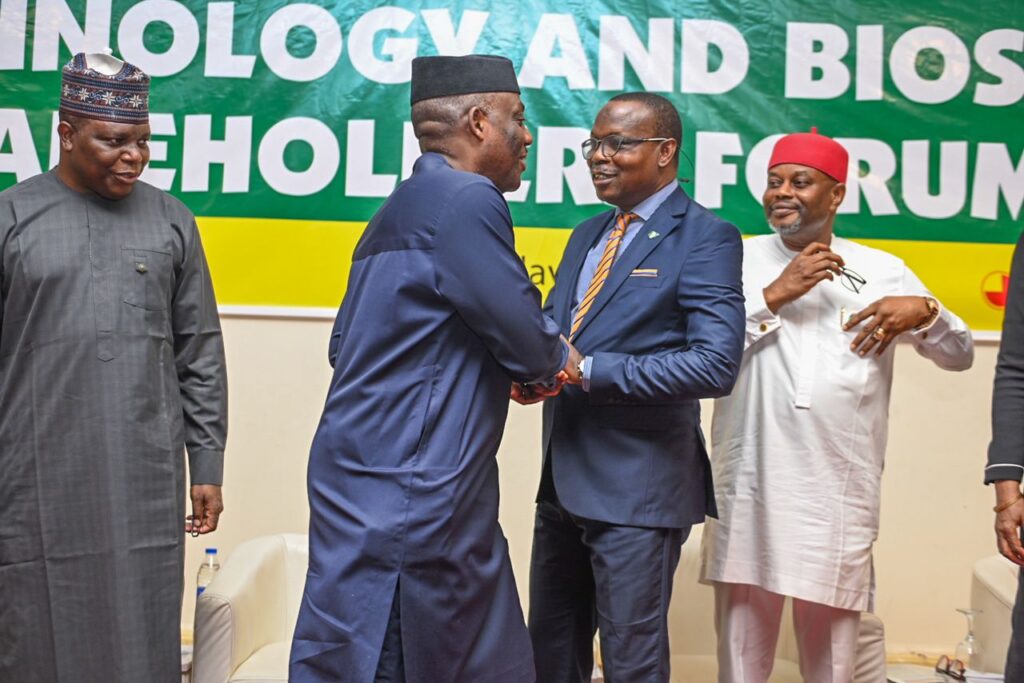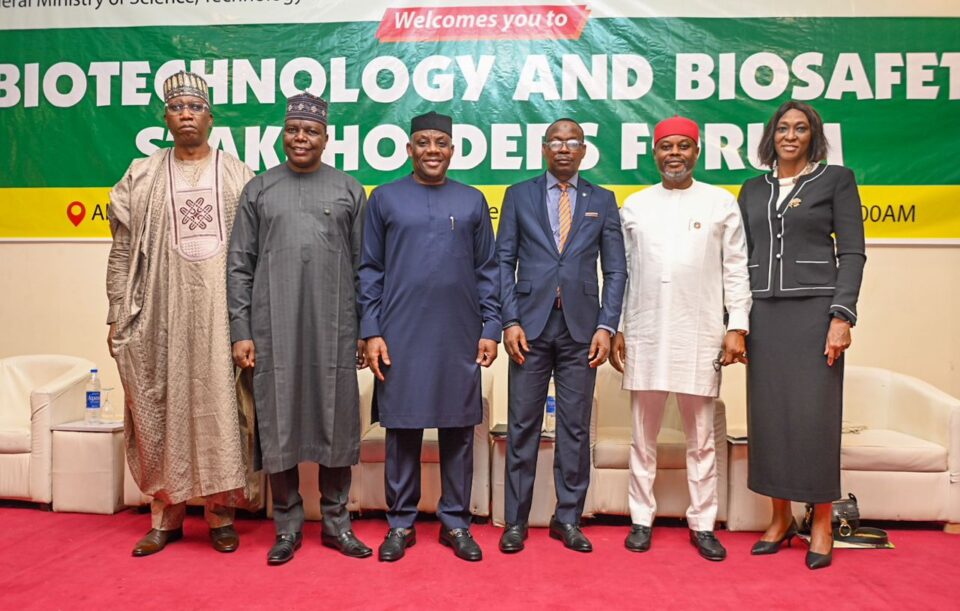By Chuks Oyema-Aziken and Felix Khanoba
The Federal Government has emphasized the importance of genetically modified organisms (GMOs) to ensure food security in the country.
Speaking at a stakeholders’ meeting on biosafety and biotechnology on Tuesday in Abuja, Minister of State for Environment, Dr. Iziaq Adekunle Salako, said the deployment of modern biotechnology is critical to achieving the vision of the Bola Tinubu-led government.
“Biotechnology is science, and its products, like GMOs, have an important role to play in ensuring food security, creating jobs, reducing poverty, and generally improving the standard of living of Nigerians, which are key elements in the eight-point agenda of President Bola Ahmed Tinubu,” Salako said.

While saying the Federal Ministry of Environment is deeply committed to the vision of President Tinubu to remodel the Nigerian economy, the minister said the deployment of biotechnology is critical in that regard.
“The deployment of modern biotechnology is critical to achieving this vision of Mr. President, and we are determined to ensure that our biotechnology solutions are well grounded in scientific evidence, ethical deployment, safe application, and freedom of choice.
“Biotechnology, without any doubt, has provided revolutionary breakthroughs in environmental science and agriculture, helping us to reduce the use of pesticides, protect biodiversity, reduce erosion and greenhouse gas emissions, increase tolerance to drought and flood, and improve nutrition.
“Biotechnology remains an important tool in our quest to adapt to the challenges of climate change. In healthcare, it has redefined our approach to disease prevention, diagnosis, and treatment, thus helping patient outcomes and beaming positivity around diseases previously considered incurable.”
On the concerns around biotechnology products, especially GMOs, the minister assured that the safety of the environment and the well-being of Nigerians remain the cornerstones of regulatory endeavors in the ministry through the National Biosafety Management Agency .
“Biotechnology to us is therefore not just a policy or a set of regulations it is a commitment to the conscientious stewardship of life itself grounded on facts and figures and not sentiments or commercial drive.
“It is about ensuring that as we harness the potentials of genetic engineering and other biotechnological products such as GMOs, we do so with the utmost respect for nature’s balance, diversity, and safety. Our commitment is to ensure that whatever advancements we make, must not come at the cost of our planet’s health, the health of the people, or our moral compass,” he said.

The minister, however, cautioned against negative campaigns targeting GMOs and called on individuals who are against biotechnology to engage relevant stakeholders in a constructive manner.
“We must avoid sensationalism, half-truths, scaremongering, and interprofessional conflict-induced antagonism. Let us promote informed dialogue on the deployment of biotechnology based on scientific evidence. The Federal Ministry of Environment will continue to ensure that all factors are taken on-board and all stakeholders are given a voice for the biosafety of Nigerians,” he said.
On his part, Minister of Innovation, Science, and Technology, Chief Uche Nnaji, said the concerns raised in some quarters about the safety of GMOs were not unexpected.
“There is no introduction of scientific innovation in the history of mankind that has been accepted by the people without resistance. Think of when cars were first introduced, vaccines like the polio vaccine, aeroplanes, which have offered humanity one of the fastest ways of moving from one place to another, fertilizers….
“GMOs represent a remarkable advancement in agricultural biotechnology, offering the potential to enhance crop yields, improve nutritional content, and mitigate the impacts of climate change on food security, ” he said.
According to the minister, farmers across the country are already celebrating the introduction of GM cotton and GM cowpea.
“These two products are gradually becoming game changers for our farmers, giving us the hope of reviving our moribund textile industries and bridging the nation’s cowpea annual deficit.
“If we say four years is not enough to proudly say those crops are safe, then we must look at South Africa, which has been planting and eating GM maize for over a decade, and the USA, which has introduced it into its food mix for nearly three decades,” he said.
While saying it is also imperative to acknowledge the legitimate concerns raised by the public regarding the safety of GMOs, Nnaji said the Federal Government established the NBMA to act as the safety valve for the deployment of modern biotechnology in the country.

Also speaking, Minister of State for Health and Social Welfare, Dr. Tunji Alausa, harped on the importance of harnessing the potential of biotechnology advancement in the areas of agriculture and health to bring about robust development in the country.
The minister dismissed the claim that biotechnological products like GMOs are not safe for consumption, describing it as a lie.
He, however, called for proper engagement with relevant stakeholders to ensure seamless deployment of biotechnology across major sectors of the economy.
“It is important we engage in robust dialogue with relevant parties to ensure the deployment of biotechnology,” he said.
Earlier, in a welcome address, the Director General/CEO of the National Biosafety Management Agency, Dr. Agnes Asagbara, said the stakeholders’ meeting is to ensure the safe application of biotechnology and the protection of Nigeria’s biodiversity.
She said the agency is committed to providing a robust regulatory framework that safeguards human health and the environment from the potential adverse effects of modern biotechnology.
“Our mandate is to ensure the safe application of modern biotechnology and to oversee the use of genetically modified organisms (GMOs), ensuring that it do not have any adverse impact on human health, plant life, animals, or the environment.
“We are dedicated to safeguarding human health and preserving our rich biodiversity from potential adverse effects of modern biotechnology,” she said.
According to the NBMA boss, “Today’s meeting is not just an opportunity to share knowledge and experiences; it is a platform to forge partnerships and collaborate towards a sustainable future. We are here to discuss, deliberate, and decide on the best practices that will enable us to harness the immense potential of modern biotechnology while mitigating its risks.”
The AUTHORITY reports that the event, which witnessed remarks by the Director General of the National Biotechnology Development Agency, Prof Abdullahi Mustapha, also witnessed a keynote presentation on ‘Harmonizing Progress: Biosafety and Biotechnology in Sustainable Development,” by Professor Ishiyaku Mohammed, as well as testimonies from some stakeholders.



